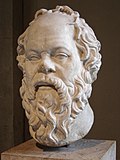Chinese philosophy and Indian philosophy, as with Mitogaku and Zen, much modern Japanese philosophy is now also influenced by Western philosophy. Before...
27 KB (3,526 words) - 06:04, 23 July 2024
absorbed, influenced, and refined into and by Japanese tradition, culture, and indigenous folk religions. The Japanese Buddhist concept of gogyo, which stems...
13 KB (1,502 words) - 18:08, 3 February 2024
history of philosophy include Western, Arabic–Persian, Indian, and Chinese philosophy. Other philosophical traditions are Japanese philosophy, Latin American...
196 KB (17,367 words) - 03:54, 27 September 2024
Chinese philosophy, Japanese philosophy, Korean philosophy, and Vietnamese philosophy; which are dominant in East Asia, and Indian philosophy (including...
84 KB (9,524 words) - 18:19, 30 August 2024
in the history of philosophy were Japanese philosophy, Latin American philosophy, and African philosophy. The history of philosophy is the field of inquiry...
191 KB (20,077 words) - 08:33, 23 September 2024
Buddhist philosophy is the ancient Indian philosophical system that developed within the religio-philosophical tradition of Buddhism. It comprises all...
147 KB (18,720 words) - 11:57, 7 October 2024
East Asian states, and its philosophy directly influenced Korean philosophy, Vietnamese philosophy and Japanese philosophy. During later Chinese dynasties...
41 KB (4,898 words) - 05:31, 19 September 2024
Akan philosophy Ethiopian philosophy Ubuntu philosophy Chinese philosophy Indian philosophy Indonesian philosophy Japanese philosophy Korean philosophy Vietnamese...
33 KB (3,073 words) - 12:43, 3 September 2024
philosophy - Italian school Jainism - Japanese philosophy - Jewish philosophy - Jingoism - Juche - Judeo-Islamic philosophies (800–1400) - Just war theory Kabbalah...
14 KB (930 words) - 17:21, 10 October 2024
a Japanese covert division known as Unit 731 conducts gruesome experiments on humans in its research for biological and chemical warfare. Philosophy of...
6 KB (452 words) - 04:35, 9 September 2024
July 7, 2024. "Japanese Confucian Philosophy". Stanford Encyclopedia of Philosophy. May 20, 2008. Parkes, Graham (January 1, 2011). "Japanese aesthetics"...
202 KB (16,511 words) - 03:48, 9 October 2024
Philosopher's Walk (category Japanese philosophy)
Tetsugaku-no-michi, lit. Path of Philosophy) is a pedestrian path that follows a cherry-tree-lined canal in Kyoto, Japan between Ginkaku-ji and Nanzen-ji...
3 KB (281 words) - 12:00, 27 April 2024
Kintsugi (category CS1 Japanese-language sources (ja))
Kintsugi (Japanese: 金継ぎ, lit. 'golden joinery'), also known as kintsukuroi (金繕い, "golden repair"), is the Japanese art of repairing broken pottery by mending...
27 KB (2,544 words) - 11:13, 6 October 2024
This is a list of important publications in philosophy, organized by field. The publications on this list are regarded as important because they have served...
46 KB (5,272 words) - 00:13, 24 April 2024
Edo neo-Confucianism (redirect from Japanese Neo-Confucianism)
Neo-Confucianism, known in Japanese as Shushi-Gaku (朱子學, shushigaku), refers to the schools of Neo-Confucian philosophy that developed in Japan during the Edo period...
14 KB (1,808 words) - 15:42, 11 March 2024
5S (methodology) (redirect from 5S Philosophy)
to use". Japanese aesthetics Just-in-time manufacturing Kaikaku Kaizen Kanban Lean manufacturing Muda Gogyo (traditional Japanese philosophy) "5S audit...
13 KB (1,403 words) - 21:42, 5 October 2024
Religion in Japan is manifested primarily in Shinto and in Buddhism, the two main faiths, which Japanese people often practice simultaneously. According...
76 KB (7,596 words) - 22:03, 9 October 2024
Element (section Philosophy and religion)
bread and wine of the Eucharist Godai (Japanese philosophy), the basis of the universe according to Japanese philosophy Mahābhūta, the four great elements...
6 KB (669 words) - 18:52, 11 September 2024
Asia and Buddhist philosophy have been studied by academic philosophers and Buddhists. General Indian philosophy and Japanese philosophy are limitedly studied...
10 KB (1,297 words) - 02:12, 30 September 2024
Kaizen (category Articles containing Japanese-language text)
goodness) without the inherent meaning of either 'continuous' or 'philosophy' in Japanese dictionaries or in everyday use. The word refers to any improvement...
27 KB (3,397 words) - 20:40, 7 October 2024
James Heisig (category American expatriates in Japan)
publish books, and lecture in Japan and abroad on philosophy and religion. He is also famed among students of the Japanese and Chinese languages for his...
19 KB (2,466 words) - 17:47, 27 September 2024
Five elements (section Philosophy)
refer to: Classical elements Godai (Japanese philosophy) Gogyo, five phase Japanese philosophy Wuxing (Chinese philosophy), ancient Chinese theory involving...
847 bytes (115 words) - 17:29, 25 April 2024
Hagakure (category Japanese philosophy)
samurai tradition, this work serves as an example of what the Japanese army thought Japanese soldiers should believe about samurai practice." In the post-war...
8 KB (989 words) - 03:38, 17 March 2024
sides. Japanese companies are known for management methods such as "The Toyota Way". Kaizen (改善, Japanese for "improvement") is a Japanese philosophy that...
176 KB (13,136 words) - 02:08, 12 October 2024
Kokugaku (category Japanese philosophy)
movement, a school of Japanese philology and philosophy originating during the Tokugawa period. Kokugaku scholars worked to refocus Japanese scholarship away...
7 KB (792 words) - 18:16, 19 September 2024
Mono no aware (category Japanese philosophy)
Edo period Japanese cultural scholar Motoori Norinaga in his literary criticism of The Tale of Genji, and later to other germinal Japanese works including...
11 KB (1,128 words) - 23:38, 21 September 2024
Neo-Confucianism (category Japanese philosophy)
Press. p. 13. Blocker, H. Gene; Starling, Christopher L. (2001). Japanese Philosophy. SUNY Press. p. 64. Huang 1999, p. 5. Chan 1963, p. 460. Levinson...
30 KB (3,650 words) - 16:41, 29 September 2024
later be explored by other Japanese logicians such as Takeo Miyake, Minoru Watanabe, and Motoki Tokieda. In the philosophy of language, predication is...
17 KB (1,979 words) - 15:05, 18 October 2023
which became an important center of philosophy in Europe in following centuries. 1228 – Dōgen introduces Sōtō Zen to Japan. 1242 – A mathematical device named...
29 KB (2,644 words) - 18:52, 9 October 2024
Will, within philosophy, is a faculty of the mind. Will is important as one of the parts of the mind, along with reason and understanding. It is considered...
43 KB (5,558 words) - 21:49, 2 June 2024















